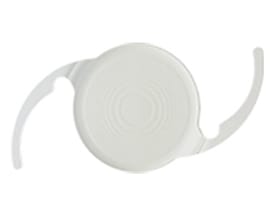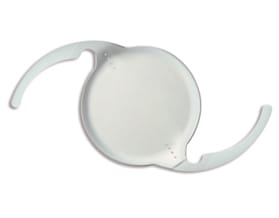Michigan's Premier Cataract Surgery
The good news is cataract surgery can be done as an outpatient procedure and has a 95% success rate. Most surgeries take less than 20 minutes and the patient can return home the same day. The surgery involves the doctor removing the natural cloudy lens and replacing it with an artificial intraocular lens that is chosen specifically for the patient. Because the Vision Institute is routinely considered to have some of the best cataract surgeons in Detroit, Michigan, patients can expect care that is unmatched in the state.
As each patient is different, recovery time can vary, but most patients experience only minor discomfort, if any at all, and can return to their normal activities within a few days. The doctors at the Vision Institute schedule several follow-up evaluations to make sure that the eyes are healing properly and that the vision is still improved.
Our cataract surgeons and specialists at the Vision Institute can evaluate your cataracts and determine if cataract surgery would be beneficial for you and your lifestyle needs.
What are cataracts?
Cataracts, the clouding of the lens of the eye, are one of the most common causes of vision loss in people over the age of 40. The lens within eye is made up of water and proteins that help keep the lens clear and properly focus light to the back of the eye. As you age, the proteins can begin to clump together inside the lens and clouding and blurring vision, or giving a brownish tinge to one’s vision. Haloes can begin to appear around lights, making night driving very difficult – and dangerous.
Obstruction of light from cataracts can results in the following additional symptoms:
- Blurred or double vision
- Difficulty reading in dim light
- Difficulty seeing road signs/street signs/obstacles during night driving
- Familiar colors don’t seem to be as vibrant or bright as they used to be
- Trouble driving at night due to glare from oncoming headlights
- Bright lights seem to have halos or can seem overly harsh
What causes cataracts?
Although cataracts most often affect the older population, there can be other reasons why they develop. Some of those reasons can be hereditary, excessive sunlight or UV exposure, medications or diabetes. Previous injuries may also trigger the onset of cataracts.
In the earlier stages of cataracts, some people may not notice any difference in their vision. As the condition progresses, most patients can still see with a change in their usual corrective lens prescription, and may continue to see well as time goes on. When patients begin to have trouble seeing even with corrective lenses, surgery is their remaining option. At the Vision Institute of Michigan, we specialize in high-quality cataract surgery services in Detroit, Michigan. Our experienced team is well-versed in identifying symptoms associated with cataracts, guiding you through the decision-making process for cataract surgery tailored to your needs.
There are a few other causes of cataracts including:
- Obesity
- Diabetes
- Hypertension
- Smoking
- Excessive sun exposure
- Certain medications
- Previous injury or surgery
- Genetics
Different types of Cataracts
There are three different types of cataracts that each occur in a different part of the lens and have different causes:
- Nuclear cataracts, which are typically age-related. They also form deep in the center of the lens, also known as the nucleus.
- Subcapsular cataracts form at the back of the lens. It can be caused by diabetes or high dosages of steroid medications.
- Cortical cataracts occur in the lens cortex, or the area around the nucleus. They appear as white wedge-like shapes that represent spokes around the center of the eye.
Cataract Detection & Prevention In Detroit
Perhaps the most well-known way to lower your risk of cataracts is maintaining a healthy, vitamin-rich diet. Vitamin A and C have been linked to eye health, so foods rich in those vitamins can potentially lower the risk of developing cataracts. Additionally, consistent use of sunglasses can shield your eyes from the sun to help preserve eye health.
Even if you maintain a healthy diet and have excellent eye health, age and genetics can still necessitate the handling of cataracts. As symptoms develop slowly over time, you may think you just need a change in your glasses or contact prescription. Other symptoms of cataracts include loss of color vibrancy, glare at night or when looking at bright lights, or blurred or clouded vision.
Cataract Treatment Options
The only known way to completely resolve cataracts is to undergo surgery. Cataract surgery is one of the most common surgeries performed in the USA, and can drastically improve your sight with a relatively quick and painless procedure.
During the surgery, the clouded natural lens is removed through a small incision on your eye. The lens is then replaced by an artificial lens. The incision does not require sutures and heals quickly on its own after the procedure. You will be in the best hands with one of our amazing doctors for your cataract surgery at the Vision Institute of Michigan.
Benefits of Cataract Surgery
One of the biggest benefits of cataract surgery is the use of a plastic intraocular lens (IOL). The artificial lens is a permanent solution for cataracts, and will never cloud like a natural lens. We offer a range of options, including monofocal lenses, multifocal lenses, and special lenses to treat both cataracts and astigmatism for clear, sharp vision.
Our experienced cataract surgeons in Detroit are dedicated to safe and effective treatment options for a range of vision problems. Our team of professionals has performed thousands of cataract surgeries and have decades of experience. You can trust your sight to our team – we are here to serve you.
Am I a Candidate for Cataract Surgery?
Determining candidacy for cataract surgery involves assessing the impact of cataracts on your vision and daily life. If you experience blurry vision, glare, or difficulty with daily activities, you might be a candidate for cataract surgery in Detroit, Michigan with our team. Consult with our experienced team at the Vision Institute of Michigan for a personalized evaluation and recommendations tailored to your specific needs.
Femtosecond Laser-Assisted Surgery
Here at VIM, we are excited to offer femtosecond laser assisted surgery which takes cataract surgery into an area of precision and increased safety. Laser-assisted cataract surgery has been available in the United States for several years and has many added benefits. With the Catalys laser system, we are able to reconstruct a 3D image of the eye to allow for precise laser treatment that can carry out critical steps which can improve efficiency, safety, and perhaps earlier vision recovery after surgery. Overall, this technology has become the most advanced technique in cataract surgery.
Intraocular Lens Options
Here at Vision Institute of Michigan, patients will be educated on the different types of artificial lenses to achieve certain goals to lessen the dependence on glasses after surgery. What type of lens you’re a candidate for will depend on certain eye characteristics and the overall lifestyle a patient strives for.
The following lenses are available during cataract surgery:

Tecnis Odyssey Full Range of Vision
Offering a full range of exceptional vision from distance to intermediate to near with best in class contrast and quality either day or night with minimal unwanted visual disturbances (halos/glare/starbursts) unlike traditional multifocal lenses.

Tecnis Symfony Extended Range of Vision
The first and only presbyopia-correcting extended range of vision IOL, delivering a continuous, full range of high-quality vision with incidence of halos and glare comparable to a monofocal IOL. Available in both a Non-Toric version and a Toric version for patients with astigmatism.

Toric IOL
Toric lens that behaves like a monofocal lens but with the added benefit of reducing and/or eliminating high degrees of astigmatism that if left untreated will continue to blur the vision after surgery. Glasses can correct the astigmatism, however, with the Toric IOL patients can reduce their dependence on glasses to drive, watch TV, or simply have a nice walk and see nature in sharpness and clarity.

Bausch + Lomb Akreos
Monofocal lens which gives high quality HD like vision, excellent contrast sensitivity, superb night driving and overall great patient satisfaction. However, because it is a one-focus lens, glasses will be needed to read and to do other near activities.
Why Choose VIM for Cataract Surgery?
Patients choose Vision Institute of Michigan (VIM) for cataract surgery because of the practice’s commitment to advanced technology, personalized care, and consistently excellent outcomes. VIM’s experienced cataract surgeons use modern techniques, including laser-assisted cataract surgery, to enhance precision, safety, and visual results, while offering a full range of premium intraocular lens options to help patients reduce their dependence on glasses after surgery. From the initial consultation through recovery, patients receive clear education, individualized treatment planning, and compassionate support from a team that has successfully performed thousands of cataract procedures. This combination of surgical expertise, cutting-edge technology, and patient-centered care makes Vision Institute of Michigan a trusted choice for restoring clear, high-quality vision.
Cataract Surgery FAQs
Is cataract surgery safe?
Yes. Cataract surgery is one of the most commonly performed and safest surgical procedures in medicine, with a very high success rate when performed by an experienced ophthalmologist.
How long does cataract surgery take?
The procedure itself usually takes about 10–15 minutes per eye. Patients typically go home the same day.
Does cataract surgery hurt?
Most patients experience little to no pain during cataract surgery. Mild pressure or discomfort may be felt, but anesthesia and numbing drops are used to keep you comfortable.
Will I still need glasses after cataract surgery?
That depends on the type of lens implant you choose. Standard lenses may still require glasses for reading or distance, while premium lenses can reduce dependence on glasses for many activities.
Can cataracts come back after surgery?
No, cataracts cannot return once removed. However, some patients may develop cloudiness behind the new lens over time, which can be easily treated with a quick, painless laser procedure.
Are both eyes treated at the same time?
Typically, cataract surgery is performed on one eye at a time, with the second eye treated after the first has healed, usually within a few weeks.
© Vision Institute of Michigan. All Rights Reserved. Web Design & Internet Marketing by Studio III
Digital Strategy by SEOversite

